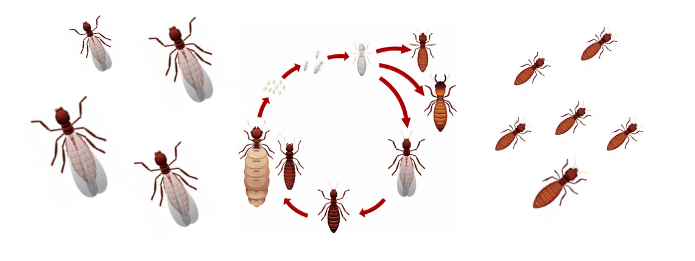When Do Ants Breed?

We think we know a lot about ants, but these impressive pests still have interesting habits and behaviours that many of us don’t know enough about. The more you know about ants, the easier it will be for you to spot them inside your home, and prevent an ant control problem before it’s too late.
In this article, we’re going to explain the reproduction patterns of ants. There are thousands of ant species, but we’ll look at some common behaviours and how ants reproduce. We’ll look at what happens when ants get inside your home and why you need to call Truly Nolen for any ant control issues.
The Reproduction Cycle of Ants
Most ant nests will begin in the same way. It’s common knowledge that a queen ant is responsible for the reproduction inside a nest. Larger ant colonies can also have one or two other queens which help to support a nest that needs a huge number of worker ants.
Less common though, is knowing how a queen creates a nest and establishes herself at the head of it. Once an already-developed nest is ready to colonize other territories, the queen will produce winged male and female breeding ants. Incredibly, the queen ant can control the sex of her offspring and even decide whether or not they’ll have wings.
In ideal conditions (spring and summertime) and when a colony has a strong population, the queen will decide that it’s the right time to produce breeding ants. These winged ants will all take flight at the same time, hundreds of thousands at a time. They’ll meet in what’s known as a nuptial flight, where winged ants from many different nests will all meet in a swarm. Some flying ants won’t survive long as they’ll quickly become prey for many other different insects and animals.
During the swarm, many queen ants will successfully breed. Both female and male ants will lose their wings and male ants will quickly die, having achieved what they set out to achieve. Females will search for a place to begin a new ant colony in the hope that they aren’t spotted by predators.
If she survives long enough to find a suitable spot, the female ant will produce worker ants and begin to build her nest. She’ll continue to produce the offspring she needs with the stored pouch of male sperm that she keeps. Her worker ants will continue to build the nest and the queen will continue to lay eggs as required.
What Happens Inside a Home?
Queen ants will generally decide to produce their breeding ants when they have the best chance of surviving in spring and summer. When the winter temperatures arrive, ants tend to limit their activities and preserve energy. They either burrow deep below their nest to stay warm or find their way inside a home for shelter and warmth. Ants which spend winters inside warm homes will be in a much stronger position for reproduction when spring arrives.
Call Truly Nolen for Any Ant Issues
Don’t leave your ant control issues to chance. If you suspect that ants may have made their way into your home, get in touch with our friendly Truly Nolen team. There’s no pest control problem we haven’t seen before and we’ll be sure to remove any ant colony.
What begins with just one queen ant can quickly become a huge population and an expensive ant control issue. By dealing with your pest issue as soon as you find it, you’ll keep your home safe during winter. You’ll also reduce the chances of having a much bigger problem come spring.
Contact Truly Nolen today for a free quote and see how we can protect your home this winter.